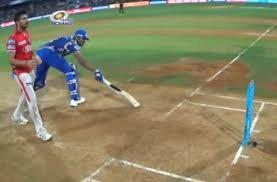
 |
| Index | |
|
|
|
|
|
| Short run, one short  A short run can only occur if more than one run is being attempted A run is considered to be short if either batter fails to make good his ground - in other words does not ground either his bat or some part of his person or equipment - behind the line marking the popping crease, before turning for the next run Interestingly, a run is only short if the batter's failure to make his ground occurs at the end of a run, not the beginning of one. So even though one short run effectively shortens the next one, only the first should be considered to be short If both batters run short on the same run, then only one run counts as short, but if different runs are short, each will count as short. In these potentially confusing circumstances umpires will frequently consult with each other to establish the precise order of events! If a boundary 4 or boundary 6 is scored then any short runs that may have been run before the ball crossed the boundary are, of course, irrelevant Once the ball is dead the umpire should call and signal Short run. If more than one run is short the umpire has to inform the scorers how many runs were actually scored All the above refers to accidental short runs. Deliberate short runs are dealt with very differently. But why would anyone want to run short on purpose? Possible reasons include, naturally, the attempt to 'score' more runs than is fair, but perhaps the commonest reason occurs in situations where there is one accomplished batter being partnered by a less talented, slower-scoring one In these circumstances, especially if the batting side are trying to build a big total quickly, or are chasing one, it obviously makes sense for the more dynamic batter to take as much of the strike as possible - hence the temptation to run short and not only gain the 'extra' run but keep the big hitter on strike If an umpire believes that a run was deliberately run short he should issue a first and final warning to both batters that the practice is unfair play, inform his colleague umpire and send the batters back to their original ends. All runs from that delivery - other than certain penalties - should be disallowed, since the Laws do not permit either side to benefit from an unlawful act, which deliberate short running most certainly is The warning applies to the entire batting side throughout their innings so if these, or any other batters, deliberately run short again, the umpire should repeat the procedure with the addition of awarding 5 Penalty runs to the fielding side and reporting the incident |
||||||